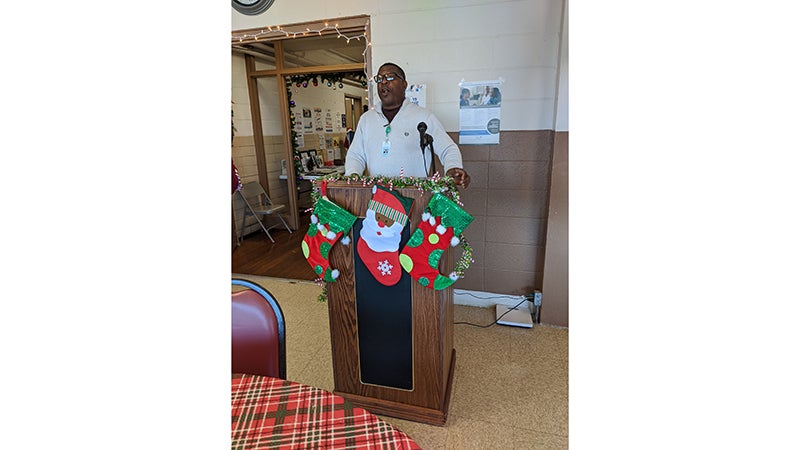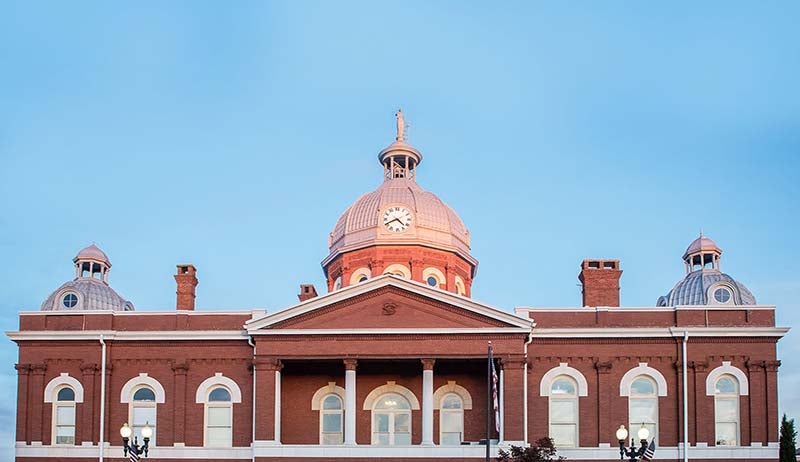Fincher talks government at Lions Club
Published 6:22 pm Tuesday, January 22, 2019

- District 37 State Rep. Bob Fincher (second from the left) was the guest speaker at the Monday evening meeting of the Valley Lions Club. He talked about the upcoming 2019 legislative session and the likelihood of passing an infrastructure bill. Among those interested in hearing what he had to say were Commissioner Sam Bradford (far left) and mayors Kyle McCoy of Lanett (fourth from the left) and Leonard Riley of Valley (far right). At center is Phillip Sparks, club president.
VALLEY — State Rep. Bob Fincher was the guest speaker at Monday’s meeting of the Lions Club of Valley. Fincher represents District 37, which includes the cities of Lanett and LaFayette along with most of rural Chambers County.
Fincher, a retired teacher who lives in Randolph County, was elected to a second term in 2018. He serves as vice chairman of the Constitution, Campaigns and Elections Committee and also serves on the Education and Policy Committee, the Agriculture and Farming Committee and the Local Legislation Committee.
“Serving on four committees keeps me busy,” he said. “We have some big issues this session, and I want your input. I like hearing from both constituents and non-constituents. We’re looking at the same issues heading into this year. The same ones keep popping up.”
No. 1 on the list appears to be infrastructure. There’s a need to keep upgrading the state’s roads and bridges. This has to be done to remain competitive with other states in terms of future growth.
“We will be looking at a possible gas tax to help with this,” Fincher said. “If we are going to have economic growth in Alabama, we are going to have to have better infrastructure. Every state around us has higher gas taxes. Economic growth is important. I know our mayors want new businesses in their communities.”
There’s also the matter of getting as many federal matching dollars as the state can get. “We don’t want to leave money on the table,” Fincher said.
The first step in this process is to have a bill that can come up for a vote.
“We have had a bill on infrastructure every year I’ve been in the legislature,” Fincher said. “It got pulled last year because it didn’t have enough votes to pass.”
Fischer said it was his personal opinion that there was more need for better roads at the county level than there was at the state level. He said that there are rural roads throughout his district that have been neglected for years. He said that he was aware that Chambers County had elected to turn some paved roads back to gravel surfaces due to lack of funding to keep them up.
“There are talks going on between the counties and the cities on what they want in this year’s bill,” he said. “It hasn’t been written yet, but it will have to have some things in it to get full consideration. Without those items, it won’t have a chance to pass.”
Fincher said that everything had to be in roads and bridges before he would vote for it. He didn’t want any of it going into hiring new people, etc.
“We need our fair share in east-central Alabama,” he said.
There’s also the matter of not getting a gas tax too high.
“In our part of the state, we have a lot of people coming over from Georgia to buy their gas,” he said. “A high gas tax would put us at a disadvantage, and we don’t want to hurt our local businesses.”
Another major issue coming up this year involves prisons and incarceration. Federal Court Judge Myron Thompson has ordered the state to do something to help those who are mentally ill. In many cases, those who suffer from this are either in jail (if they have committed a crime) or are homeless and living on the street.
Fincher said the state has a problem with not having enough prison guards.
“It’s dangerous to be a prison guard right now,” he said. “Our prisons are understaffed. It’s dangerous to hold prisoners when you don’t have enough guards. There’s also been some talk of specialty prisons or places where those who are sick can be kept. The state is responsible for taking care of prisoners with medical problems, and that can be very expensive.”
Fincher said he expects another attempt at passing a lottery bill. He said that he had voted in favor of it when it previously came up.
“I’ve never bought a lottery ticket in my life,” he said. “I don’t think it’s a smart investment, but I do think there’s a lot of money leaving our district and going to Georgia because they have a lottery. That money needs to stay here.”
The state has two budgets. The Education Trust Fund gets the lion’s share of it, some $6.6 billion last year. The General Fund budget comes to a little more than $2.2 billion.
“We have been in a good economic period for some time,” he said. “When there’s good tax revenue coming in, there’s money for education. The teachers got a 2.5 percent raise last year and a 4 percent raise four years ago. We need to do this to get our teacher pay up to the level of surrounding states. Alabama is a great state for 4-year-olds. We have one of the best K4 programs in the nation. Transportation, textbooks and libraries have been getting more funding in recent years because of the good economy we’ve been in. There’s also been more funding for security systems at schools.”
The state does have what’s called a rolling reserve to help get through down periods. “Proration can be devastating,” Fincher said. “Fortunately, we haven’t had to deal with it lately. The rolling reserve was set up to help us with that.”
Another positive benefit of a good economy is that Medicaid rolls have been declining in recent years.
“Unemployment is down,” he said. “People have jobs with benefits, and they don’t need it. That frees up money we can spend on other things.”
Last year, the state put another $9 million into mental health and $2.5 million to track opioid use in the state.
“The General Fund has always been a patchwork budget,” Fincher said. “It frequently gets in trouble because of this. At some point, the legislature will have to tackle it and make it more financially sound.”
A member of the club asked Fincher if Alabama would be adopting a law similar to the new one in Georgia that’s designed to discourage the use of cell phones when driving.
“I expect we’ll be doing that,” he said.





